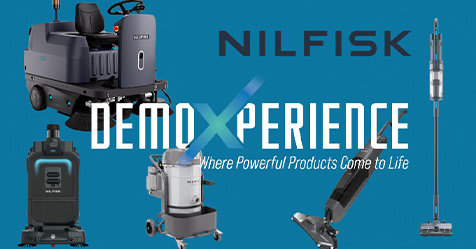Rarely in the commercial cleaning business will you hear the term, “general cleaning.”
That is because each cleaning task is unique; unique cleaning problems produce unique cleaning solutions.
In following this adage, the maintenance of industrial floors is no different.
Rather than blindly jumping into an industrial floor care project, building service contractors (BSCs) and in-house service providers (ISPs) need to formulate an all-encompassing plan that is understood and adhered to by everyone.
Included in this plan are things like: Training and education; selecting the proper tools, chemicals and procedures for the task; voicing expected cleaning results; and having a chain of command that allows for accountability.
Whether you have been maintaining industrial floors for years, or you have thought about it but were unsure how to begin, the following tips should clarify your goals — or help you establish new ones.
Know your plan
Floor maintenance works best when the duties, frequency of tasks and other services necessary to maintain the floor have been outlined and written down.
Everyone involved in floor maintenance should be aware of and be a part of the floor maintenance plan.
The floor maintenance plan should also outline exactly how the floors are to be maintained.
For instance, it should spell out what kind of equipment is to be used, when floors are to be cleaned, how often they are to be refinished and what chemicals and products are necessary to refinish them.
The facility manager should determine how much will be invested in floor maintenance.
In other words, what is the floor worth?
This will help determine the equipment, labor and amount of time necessary to maintain the floor.
Cleanliness is key
Regular maintenance — including such things as placing mats at entries, vacuuming them regularly and maintaining the outside entries by removing oily soils on sidewalks and parking lots — helps keep industrial floors clean.
In addition, all building lobbies and entries should be dust mopped, mopped and cleaned daily.
More advanced floor care equipment, such as scrubbers, burnishers and cylindrical machines, can significantly reduce the time needed to care for floors.
In many situations, the cost savings on labor will pay for the machines in just a few months.
A JanSan distributor”s job is to stay abreast of new products and technologies in the cleaning industry.
Let your distributor be your guide and adviser in tackling floor care challenges.
Even the best cleaning equipment is useless if you do not know how to properly operate and maintain it.
Therefore, ongoing training for all workers, supervisors and managers is necessary.
It eliminates bad habits that often develop and do not fit into the floor maintenance plan.
It also boosts professionalism and keeps the work mentally challenging.
How is industrial floor care equipment different?
The major difference is often the size of the equipment necessary to maintain these floors.
Industrial facilities are often quite vast, requiring larger machines to maintain them.
In addition, managers of industrial facilities will usually look for the most efficient equipment they can find, such as machines that can multitask: Scrub, clean and polish.
Some more advanced cylindrical floor equipment can also perform a wet sweep before the scrubbing process.
This eliminates the need for dry mopping before scrubbing — resulting in increased productivity as well as money savings.
Industrial facilities often have concrete, vinyl composition tile (VCT) or epoxy coated floors.
These hardy surfaces are installed to handle heavy foot traffic and hold up to wear and tear.
An office or school may have wood, marble, stone and other types of floors that require more specialized floor care equipment and chemicals.
Safety concerns
Worker safety is always a top priority.
Depending on the type of industrial facility, this can be a serious problem.
For instance, industrial facilities that process meats and other food items often develop slippery floors during the course of the day.
Because of this, floor maintenance is often required throughout the day.
The chemicals selected for floor maintenance are also a concern. These chemicals, of all cleaning products, can be some of the most potentially harmful to the environment.
Environmentally preferable floor care chemicals are now being introduced that work as effectively as conventional products but with less impact on the environment.
Moreover, the type of equipment used can affect the indoor environment.
For industrial facilities, floor care machines with passive vacuum systems are necessary.
These vacuums keep impurities from being released into the air, protecting the health of cleaning professionals and industrial workers.

